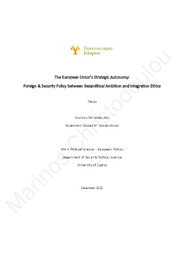| dc.contributor.advisor | Constantinou, Costas M. | en |
| dc.contributor.author | Christodoulou, Marinos | en |
| dc.coverage.spatial | Cyprus | en |
| dc.date.accessioned | 2023-07-05T06:08:29Z | |
| dc.date.available | 2023-07-05T06:08:29Z | |
| dc.date.issued | 2022-12-15 | |
| dc.identifier.uri | http://gnosis.library.ucy.ac.cy/handle/7/65581 | en |
| dc.description.abstract | Η καθιέρωση του στρατηγικής αυτονομίας ως της φιλοδοξίας για την εξωτερική πολιτική και πολιτική ασφαλείας της ΕΕ εν μέσω εντεινόμενου διεθνούς ανταγωνισμού, όχι μόνο μετατοπίζει την συζήτηση για τις εξωτερικές σχέσεις της Ένωσης προς την πολιτική ισχύος, αλλά ταυτόχρονα
δημιουργεί ερωτήματα ως προς τη συνάφεια της με το πρόταγμα ολοκλήρωσης. Προτάσσοντας την στρατηγική αυτονομία ως προϋπόθεση για την εξωτερική ικανότητα της ΕΕ, η συζήτηση προτείνει μια εξωτερική πολιτική και πολιτική ασφάλειας η οποία αντιτίθεται στα θεμελιώδη ήθη του Ευρωπαϊκού προτάγματος, νομιμοποιώντας τη σκληρή ισχύ και εντείνοντας το ρόλο των εξωτερικών συνόρων ως χώρους αποκλεισμού.
Η συμβατική θεωρία διεθνών σχέσεων κρίνεται ανεπαρκής να αξιολογήσει τον ισχυρισμό, γιατί εν πολλοίς τον παράγει και ταυτόχρονα παραμένει κρατοκεντρική. Αντιμετωπίζοντας τη συζήτηση στρατηγικής αυτονομίας ως θεωρία, αναζητούνται τα σημειολογικά πλαίσια στα οποία αναδύεται ο ισχυρισμός και αντιπαρατίθενται οι γεω-πολιτικές της προεκτάσεις με αυτές της ολοκλήρωσης. | el |
| dc.description.abstract | The adoption of strategic autonomy as the ambition for foreign and security policy of the European Union, amidst intensified international rivalry, does not only shift the debate for European external relations onto power politics, but at the same time raises questions for its relevance to the integration project. By pronouncing strategic autonomy as the condition of the EU’s external capacity, the debate suggests a foreign and security policy which contradicts the foundational ethics of the European project, by legitimizing hard power and intensifying the external boundaries of the Union as sites of exclusion.
Conventional theory seems inadequate to evaluate the claim for strategic autonomy, which at large produces and concurrently remains state-centric. Treating the debate of strategic autonomy as a theoretical discourse itself, the current thesis examines the semantic frameworks through which the claim emerges and juxtaposes its geo-political implications with those of integration. | en |
| dc.language.iso | eng | en |
| dc.publisher | Πανεπιστήμιο Κύπρου, Σχολή Κοινωνικών Επιστημών και Επιστημών Αγωγής / University of Cyprus, Faculty of Social Sciences and Education | |
| dc.rights | info:eu-repo/semantics/openAccess | en |
| dc.rights | Open Access | en |
| dc.title | The European Union’s strategic autonomy: foreign & security policy between geopolitical ambition and Integration Ethics | en |
| dc.type | info:eu-repo/semantics/masterThesis | en |
| dc.contributor.committeemember | | en |
| dc.contributor.department | Τμήμα Κοινωνικών και Πολιτικών Επιστημών / Department of Social and Political Sciences | |
| dc.subject.uncontrolledterm | EU | en |
| dc.subject.uncontrolledterm | EUROPEAN UNION | en |
| dc.subject.uncontrolledterm | STRATEGIC AUTONOMY | en |
| dc.author.faculty | Σχολή Κοινωνικών Επιστημών και Επιστημών Αγωγής / Faculty of Social Sciences and Education | |
| dc.author.department | Τμήμα Κοινωνικών και Πολιτικών Επιστημών / Department of Social and Political Sciences | |
| dc.type.uhtype | Master Thesis | en |
| dc.contributor.orcid | Constantinou, Costas M. [0000-0002-0049-9249] | |
| dc.gnosis.orcid | 0000-0002-0049-9249 | |

